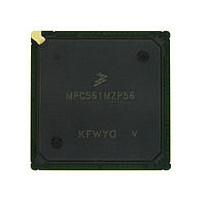MPC561MZP56 Freescale, MPC561MZP56 Datasheet - Page 244

MPC561MZP56
Manufacturer Part Number
MPC561MZP56
Description
Manufacturer
Freescale
Datasheet
1.MPC561MZP56.pdf
(1420 pages)
Specifications of MPC561MZP56
Cpu Family
MPC56x
Device Core
PowerPC
Device Core Size
32b
Frequency (max)
56MHz
Interface Type
QSPI/SCI/SPI/UART
Total Internal Ram Size
32KB
# I/os (max)
56
Number Of Timers - General Purpose
22
Operating Supply Voltage (typ)
2.6/5V
Operating Supply Voltage (max)
2.7/5.25V
Operating Supply Voltage (min)
2.5/4.75V
On-chip Adc
2(32-chx10-bit)
Instruction Set Architecture
RISC
Operating Temp Range
-40C to 125C
Operating Temperature Classification
Automotive
Mounting
Surface Mount
Pin Count
388
Package Type
BGA
Program Memory Type
ROMLess
Program Memory Size
Not Required
Lead Free Status / RoHS Status
Not Compliant
Available stocks
Company
Part Number
Manufacturer
Quantity
Price
Company:
Part Number:
MPC561MZP56
Manufacturer:
Freescale Semiconductor
Quantity:
10 000
Company:
Part Number:
MPC561MZP56R2
Manufacturer:
Freescale Semiconductor
Quantity:
10 000
- Current page: 244 of 1420
- Download datasheet (11Mb)
System Configuration and Protection
6.1.1.1
Some of the functions defined in the various sections of the USIU (external bus interface, memory
controller, and general-purpose I/O) share pins.
multiplexed pins are assigned.
6.1.1.2
Two bits in the SIUMCR control USIU bus arbitration. The external arbitration (EARB) bit determines
whether arbitration is performed internally or externally. If EARB is cleared (internal arbitration), the
external arbitration request priority (EARP) bit determines the priority of an external master’s arbitration
request. The operation of the internal arbiter is described in
6.1.2
External master modes are special modes of operation that allow an alternative master on the external bus
to access the internal modules for debugging and backup purposes. They provide access to the internal
buses (U-bus and L-bus) and to the intermodule bus (IMB3).
There are two external master modes:
6-4
.
•
IRQ0 / SGPIOC0 / MDO4
IRQ1 / RSV / SGPIOC1
IRQ2 / CR / SGPIOC2 / MTS
IRQ3 / KR / RETRY / SGPIOC3
IRQ4 / AT2 / SGPIOC4
IRQ5 / SGPIOC5 / MODCK1
IRQ6 / MODCK2
IRQ7 / MODCK3
SGPIOC6 / FRZ / PTR
SGPIOC7 / IRQOUT / LWP0
BG / VF0 / LWP1
BR / VF1 / IWP2
BB / VF2 / IWP3
IWP[0:1] / VFLS[0:1]
BI / STS
WE[0:3] / BE[0:3] / AT[0:3]
TDI/DSDI / MDI0
TCK / DSCK / MCKI
TDO / DSDO / MDO0
DATA[0:31] / SGPIOD[0:31]
ADDR[8:31] / SGPIOA[8:31]
RSTCONF /TEXP
Peripheral mode (enabled by setting PRPM in the external master control (EMCR) register) uses a
special slave mechanism that shuts down the RCPU and an alternative master on the external bus
can perform accesses to any internal bus slave.
External Master Modes
USIU Pin Multiplexing
Arbitration Support
Pin Name
Table 6-1. USIU Pin Multiplexing Control
MPC561/MPC563 Reference Manual, Rev. 1.2
Note:MDIO, MCKI, and MDO0 are controlled by READI enable.
Programmed in SIUMCR and Hard Reset Configuration
Table 6-1
Note:MDO4 is controlled by READI enable.
Otherwise: Programmed in SIUMCR
Otherwise: Programmed in SIUMCR
At Power-On Reset: MODCK[1:3]
At Power-On Reset: RSTCONF
Multiplexing Controlled by:
Programmed in SIUMCR
summarizes how the pin functions of these
Section 9.5.7.4, “Internal Bus
Freescale Semiconductor
Arbiter.”
Related parts for MPC561MZP56
Image
Part Number
Description
Manufacturer
Datasheet
Request
R

Part Number:
Description:
MPC5 1K0 5%
Manufacturer:
TE Connectivity
Datasheet:

Part Number:
Description:
MPC5 500R 5%
Manufacturer:
TE Connectivity
Datasheet:

Part Number:
Description:
MPC5 5K0 5%
Manufacturer:
Tyco Electronics
Datasheet:

Part Number:
Description:
MPC5 5R0 5%
Manufacturer:
Tyco Electronics
Datasheet:

Part Number:
Description:
MPC5 50K 5%
Manufacturer:
Tyco Electronics
Datasheet:

Part Number:
Description:
MPC5 1R0 5%
Manufacturer:
Tyco Electronics
Datasheet:

Part Number:
Description:
TOWER ELEVATOR BOARDS HARDWARE
Manufacturer:
Freescale Semiconductor
Datasheet:

Part Number:
Description:
TOWER SERIAL I/O HARDWARE
Manufacturer:
Freescale Semiconductor
Datasheet:

Part Number:
Description:
LCD MODULE FOR TWR SYSTEM
Manufacturer:
Freescale Semiconductor
Datasheet:

Part Number:
Description:
DAUGHTER LCD WVGA I.MX51
Manufacturer:
Freescale Semiconductor
Datasheet:

Part Number:
Description:
TOWER SYSTEM BOARD MPC5125
Manufacturer:
Freescale Semiconductor
Datasheet:












